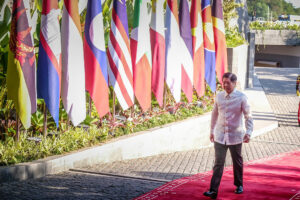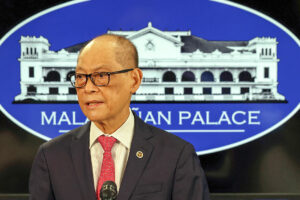Words, words, words

The proposed Philippine version of a sovereign wealth fund is called the Maharlika Investment Fund (MIF — formerly the Maharlika Wealth Fund) in honor of the late dictator Ferdinand Marcos, Sr. “Maharlika” means of noble or aristocratic birth, and was one of Marcos’ favorite buzzwords. Marcos often used that word to imply that he, his wife, and the rest of his family are the country’s entitled nobility (there are paintings of the duo bedecked a la king and queen, complete with a tiara-crowned Imelda Marcos). He also entertained the idea of renaming the Philippines “Maharlika.”
The use of that word during his son’s regime is similar to the revival of the “Kadiwa” stores, which, as part of the Marcos Sr. dictatorship’s unsuccessful attempt to curb inflation, were supposed to help stabilize the prices of prime commodities, particularly that of rice, the cost per kilo of which, then as now, was increasing by the day.
“Kadiwa” means “of the same mind”— it echoed the dictatorship’s “Isang Bansa, Isang Diwa” (One Nation, One Mind) slogan, which made it appear that uniformity rather than diversity of thought is the supreme national virtue.
All that aside, however, the legal and other infirmities of the now renamed MIF bill have outraged lawyers, economists, workers’ groups, pensioners, and the business community. Among those defects were its proposed board of directors’ exemption from accountability and various laws; the Fund’s initial intent of using the contributions of Social Security System (SSS) and Government Service Insurance System (GSIS) members; its possible impact on pensioner funds and even on the Bangko Sentral ng Pilipinas (BSP, the Central Bank of the Philippines); the President of the Philippines’ heading it; and the distinct possibility of its being just another slush fund.
Its proponents have so far announced that the MIF would no longer use SSS and GSIS funds, due perhaps to the protests against it — but most likely because of their realization that both Systems have hundreds of millions of pesos in deficits.
In any case, the way they have been trying to make it appear that they are correcting the flaws of the bill creating the MIF suggests that 1.) it was not well thought out, and 2.), its proponents are determined to pass it. But as serious as its defects and its advocates’ seeming determination to ram it through Congress are, there are far more problematic issues that it raises.
Filed by Marcos cousin and House of Representatives Speaker Martin Romualdez and Marcos son Sandro, who is the First District of Ilocos Norte Representative and also Senior Deputy Majority Leader of the House, the original draft of the bill was hastily passed at the committee level on Dec. 1, which by itself alone raises suspicions about its real intent.
Even Marcos Jr.’s sister, Senator Maria Imelda “Imee” Marcos, expressed serious concerns over the proposal, given the Malaysian experience with former Prime Minister Najib Razak who was accused of misusing that country’s own sovereign wealth fund and was subsequently convicted of corruption. Senator Marcos also pointed out that a sovereign fund is usually established when a country has excess earnings beyond its budgetary requirements, which the Philippines does not have. She questioned the timing of the bill, since the country is indebted to international banking institutions to the tune of P13 trillion-plus, and there is also a looming global recession.
Economist and BSP Governor Felipe Medalla also raised the alarm against establishing a sovereign wealth fund. Recalling Malaysia’s experience, Medalla was concerned about the Fund’s impact on governance and corruption, and its possible effect on the independence of the BSP.
The fundamental question, however, is why the Fund is being proposed despite the lack of resources needed, and the country’s pressing problems with human rights violations, inflation, unemployment, energy and food insecurity, poverty, and the growing incidence of hunger. Marcos Jr. has talked about some of these issues in various venues, such as at the United Nations General Assembly last September and the Asia-Pacific Economic Cooperation (APEC) summit. But both as President of this Republic and as his own Secretary of Agriculture, his motherhood declarations — “we must raise production”; “our industries must develop,” etc., etc. — make it appear that rather than nothing, something is being done about them.
The reality is that there are hardly any coherent programs to remedy the country’s immediate problems. It suggests that the Philippines’ current President does not really know what his government should be doing, such as the steps needed to ease the surge in unemployment the pandemic triggered, and the consequent decline of the economy. He has identified in his speeches what must be done — but he has been sorely deficient in saying exactly how, for example, he intends to combat inflation. In some of his speeches he in effect said that only with luck could the government curb it. He has not declared what he specifically intends to do not only about the country’s low agricultural productivity, but also its other problems, such as the country’s growing food insecurity.
His visit to a “Kadiwa sa Pasko” (Kadiwa on Christmas) store launched by the Quezon City Government on Dec. 1 was typically long in generalities and short in specifics. His speech did nothing more than recall the original purpose of Kadiwa stores, which he said was to connect producers to markets in far-flung areas. He did not say how those stores can do that today, half a century later.
The government-regulated and crony press during his father’s dictatorship did not look into whether those stores served their declared purpose. What is distressing is that much of today’s supposedly free press seems to be just as willing to uncritically echo the current attempt to prettify Marcos Sr.’s governance record and to merely quote his son’s utterances as he attempts to replicate, of only in words and labels, that mythical “golden age.” Marcos Jr. repeated during the Kadiwa sa Pasko QC launch what he had already said about making rice available for only P20 per kilo. Completely missing in his speech was any response to criticisms of that claim as unrealizable, with the current market price of rice still at P38 to P50 per kilo, or higher. And yet, how he will fulfill his P20-per-kilo-rice promise is as important an issue as that of keeping the country’s rice supplies at a sustainable level as the Kadiwa stores take what they will be selling from the country’s buffer stocks.
No one can be blamed for concluding that these Kadiwa launches are nothing more than public relations ploys and a complete waste of taxpayer money. While all this publicity was distracting the public, the inflation rate was rocketing to 8% —the highest since 2008, or 14 years ago. The prices of various products have been steadily rising, and in seeming response, the number of Marcos’ speeches have spiked as well. But he has not said anything concrete during those occasions about curbing inflation and solving other problems of the same urgency; instead, he has been exaggerating the supposed availability of cheap rice in the handful of Kadiwa stores that have opened across this archipelago of 7,000-plus islands and over 100 million souls.
Six months into this Presidency, the only concrete project the Marcos Jr. regime is focused on is the unneeded, unwanted, and untenable but presumably self-servingly lucrative Maharlika Investment Fund. As for the country’s real problems, only words, words, words and even more words are being used to —quite literally — address them. n
Luis V. Teodoro is on Facebook and Twitter (@luisteodoro).
www.luisteodoro.com




